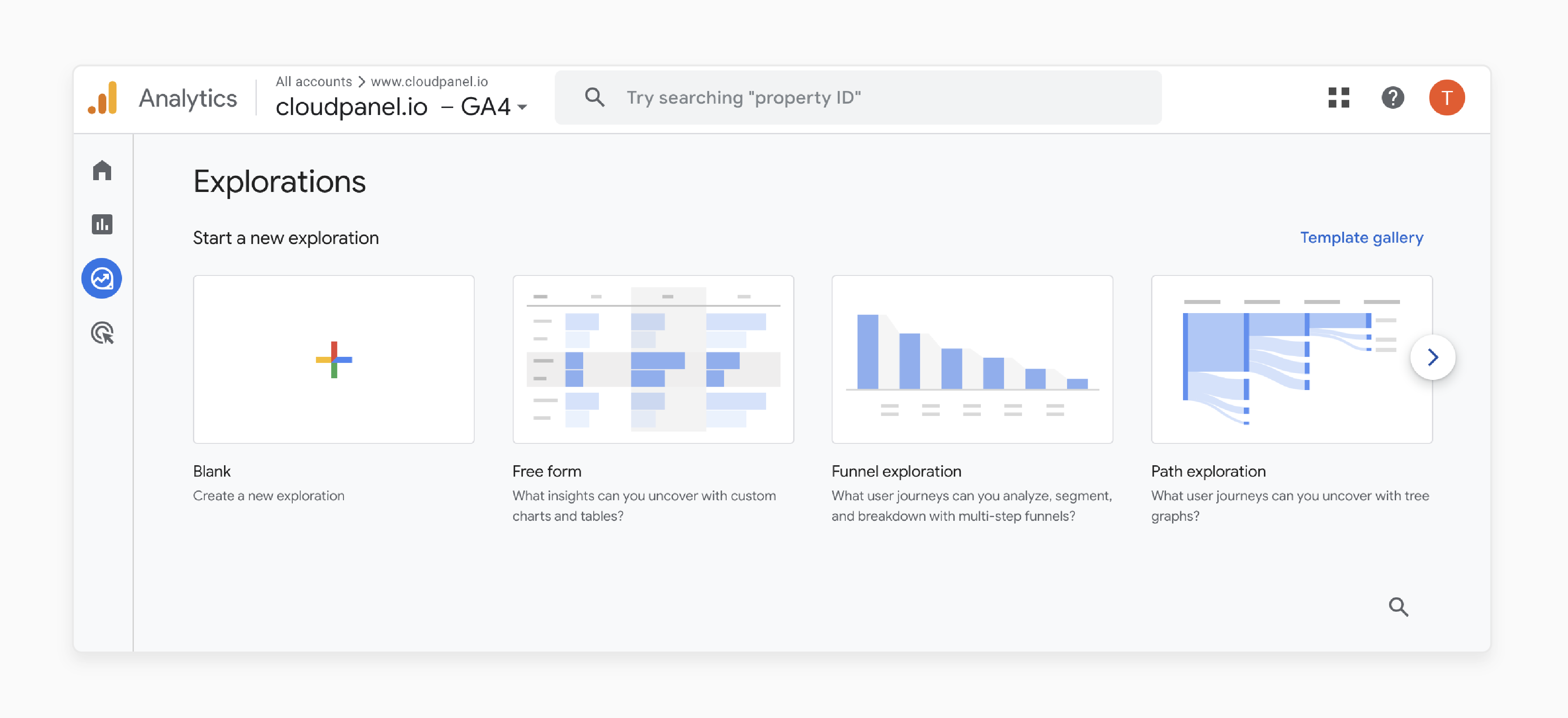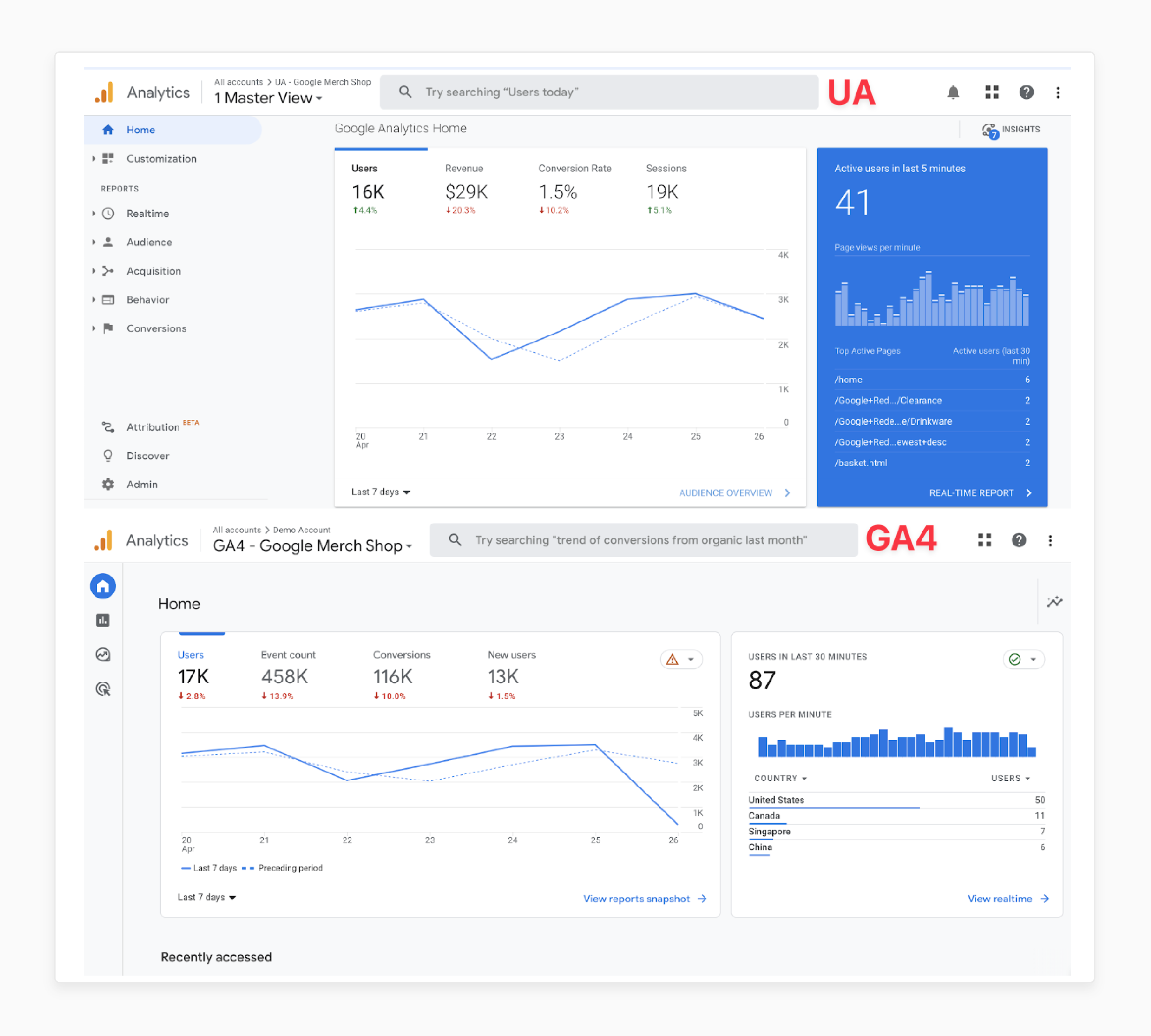
Google Universal Analytics in Magento 2 vs Google Analytics 4
Want to track your store’s performance and boost your conversion rate? Google Universal Analytics in Magento 2 offers powerful tools to monitor customer behavior and optimize your marketing efforts.
In this article, we will explore the difference between Google Universal Analytics and Google Analytics 4.
Key Takeaways
-
What is Google Universal Analytics in Magento 2?
-
How Does the Deprecation of Google Universal Analytics Affect Magento 2?
-
Benefits of Using Google Analytics 4 Over Universal Analytics in Magento 2
-
Google Universal Analytics vs Google Analytics 4 in Magento 2
-
How Does the Deprecation of Google Universal Analytics Affect Magento 2?
-
Benefits of Using Google Analytics 4 Over Universal Analytics in Magento 2
-
Google Universal Analytics vs Google Analytics 4 in Magento 2
What is Google Universal Analytics in Magento 2?
Google Universal Analytics in Magento 2 integrates Google’s previous analytics platform with your Magento store to track and analyze visitor behavior.
The tool provides insights into:
-
Traffic sources
-
User interactions
You can set up Universal Analytics in Magento 2 by entering your tracking ID in the configuration settings.
The integration helps you monitor site performance and user engagement. It is important to note that Google Universal Analytics is being phased out in favor of Google Analytics 4 (GA4).
How Does the Deprecation of Google Universal Analytics Affect Magento 2?
1. Transition to Google Analytics 4 (GA4)
-
GA4 introduces a new event-based data model. It moves away from the session-based model of Universal Analytics.
-
The change provides more granular data and better insights into user interactions.
-
Magento2 users must implement GA4 tracking codes on their sites. It involves configuring GA4 properties and updating tracking scripts.
-
It helps ensure compatibility with GA4’s requirements.
2. Data Migration Challenges
-
Historical data collected under Universal Analytics will not be automatically transferred to GA4.
-
Businesses need to maintain access to their Universal Analytics data for historical comparison and trend analysis.
-
GA4’s reporting interface and data model are different. Businesses may need to adjust their reporting practices.
-
It will help ensure a smooth transition and data continuity. It is advisable to run Universal Analytics and GA4 in parallel until the entire switch is made.
-
It allows for a comparison of data and ensures no loss of tracking capabilities.
3. Feature and Metric Adjustments
-
GA4 introduces new metrics and dimensions that may require adjustments. It is generally in how reports are generated and interpreted.
-
Users may need to redefine custom events and goals based on GA4’s new event structure.
-
It involves updating existing eCommerce tracking to align with GA4’s enhanced capabilities.
4. Custom Integrations and Tracking
-
Existing custom integrations built for Universal Analytics may need to be updated or reconfigured to work with GA4.
-
It includes anything that interfaces with Universal Analytics, including:
1. Custom data layers
2. Tracking pixels
3. Plugins
-
GA4 provides automatic tracking for certain types of interactions. It may reduce the need for custom tracking setups.
-
It also requires adjustments to how data is collected and reported.
5. Implementation Steps
-
Set up a new GA4 property in Google Analytics and obtain the latest tracking code.
-
Integrate the GA4 tracking code into Magento 2’s configuration. It may involve updating the admin panel settings or modifying theme files to include the new GA4 scripts.
-
Test and verify that GA4 is accurately tracking and reporting data. You should also ensure that all key metrics and events are captured as expected.
Benefits of Using Google Analytics 4 Over Universal Analytics in Magento 2
1. Enhanced Data Model
-
The shift allows for more precise tracking of specific user interactions, such as:
1. Clicks
2. Video views
3. Form submissions
-
It gives a more detailed view of how users engage with products and features. It leads to better insights into shopping behaviors and site performance.
2. Improved User Insights
-
GA4 integrates data from both web and app interactions. It offers a more comprehensive view of user journeys across different platforms.
-
It is beneficial for businesses with both online stores and mobile apps.
-
GA4 focuses on user engagement and lifetime metrics. It provides deeper insights than Universal Analytics.
-
It helps understand long-term user behavior and improve customer retention strategies.
3. Advanced Analysis Tools

-
GA4 provides advanced analysis tools like Exploration Reports and Analysis Hub. These allow for custom queries and detailed insights into:
1. User behavior
2. Conversion paths
3. Engagement metrics
-
GA4 offers predictive metrics, such as churn probability and revenue forecasts using machine learning,
-
It helps Magento 2 users anticipate future trends and make data-driven decisions.
4. Enhanced Privacy and Compliance
-
GA4 is designed to work in a future where cookies might be limited or unavailable. It provides more privacy-focused tracking solutions.
-
It helps maintain compliance with evolving data privacy regulations.
-
GA4 offers more detailed data controls and user privacy features. These help businesses manage and protect user data effectively.
5. Better Integration with Google Ads
-
GA4 integrates more smoothly with Google Ads. It offers improved tracking of ad performance across different devices and platforms.
-
It helps optimize marketing campaigns and understand ROI more accurately.
-
The event-based model and improved integration with Google Ads allow for more precise tracking of conversions and ad interactions. It leads to better campaign optimization.
6. Future-Proofing Analytics
-
GA4 is designed to adapt to future changes in technology and data privacy regulations.
-
The transition ensures that Magento 2 users are equipped with an analytics platform. It will continue to evolve and meet emerging industry standards.
-
GA4 includes advanced features such as predictive analytics and automated insights. These are not available in Universal Analytics.
-
These innovations help Magento 2 users enhance data analysis and reporting.
7. Improved Reporting Interface

-
The GA4 reporting interface is more flexible and user-friendly. It allows for customization based on specific business needs.
-
Users can create tailored reports that focus on key metrics relevant to their Magento 2 store, such as:
1. Sales performance
2. User Engagement
3. Product Effectiveness
-
GA4 provides improved data visualization options. It helps interpret and act on analytics data.
-
It includes interactive dashboards and visualizations that help you quickly identify trends and anomalies.
Google Universal Analytics vs Google Analytics 4 in Magento 2
| Feature | Google Universal Analytics (UA) | Google Analytics 4 (GA4) |
|---|---|---|
| 1. Data Model | It offers a session-based model. It is where user interactions (e.g., page views and events) are grouped into sessions. It makes the focus more on sessions. | It offers an event-based model. It is where each interaction (e.g., page views, clicks) is tracked as a separate event. It helps emphasize users' behavior. |
| 2. Cross-Platform Tracking | It primarily focuses on web-based interactions. It makes it difficult to combine data from different devices or platforms. | It combines data from both web and mobile apps. It offers a smooth cross-platform tracking for a holistic view of user behavior. |
| 3. User-Centric Metrics | The metrics are more session-oriented. It focuses on page views, bounce rate, and average session duration. | The metrics are more user-oriented. It provides insights like user engagement, active users, and retention. It gives a clearer view of user activity over time. |
| 4. Reporting & Analysis | It offers predefined reports with limited flexibility. Custom reports need advanced configurations, which can be complex. | It offers advanced reporting capabilities with more flexible analysis tools. These include custom exploration reports and funnel visualizations. |
| 5. Event Tracking | Custom event tracking requires manual setup. It is through Google Tag Manager or custom coding. | Many events are automatically tracked without needing manual setup. These include scrolls, outbound clicks, and site searches. |
| 6. Machine Learning & Insights | It lacks built-in machine-learning features. Reports rely on user-defined segments and manual analysis. | It integrates machine learning to offer predictive insights and automated alerts for trends. These include churn probability and revenue forecasting. |
| 7. Audience Creation | It enables relatively static audience creation. It is based on predefined conditions. | It enables dynamic audience creation with advanced features. These include predicting which users are likely to convert or churn. |
| 8. E-commerce Tracking | It offers enhanced e-commerce. It requires manual configuration to track complex user journeys. | GA4 simplifies the setup of e-commerce tracking. It provides more granular insights into the entire customer lifecycle. |
| 9. Privacy & Compliance | It relies on cookies and IP addresses for tracking. These can pose challenges under privacy regulations like GDPR. | It offers cookieless tracking options and enhanced data deletion features. It also provides improved privacy controls for better compliance. |
FAQs
1. How do I set up a Google Analytics property in Magento 2?
To set up a Google Analytics property in Magento 2. Log into your Google Analytics account, create a new property, and obtain the tracking ID. Then, in your Magento 2 admin, navigate to Stores > Configuration > Sales > Google API. Enter the tracking ID under Google Analytics.
2. Can I use my existing Google Analytics account with Magento 2?
You can integrate your existing Google Analytics account with Magento 2. It is by entering the tracking ID from your account into Magento’s Google API settings. It will enable tracking of your store’s data in the same account you’re already using.
3. Does Magento 2 support Google Analytics Content Experiments in 2023?
Magento 2 supports Google Analytics Content Experiments. It allows you to run A/B tests for different page variations. In 2023, this feature can be integrated to test and optimize your store’s design and content for better performance.
4. How can Google Universal Analytics help my Magento 2 store in 2023?
Google Universal Analytics in Magento 2 helps track user behavior, identify trends, and measure the success of marketing campaigns. In 2023, it remains a powerful tool for optimizing product pages, improving conversions, and understanding customer preferences.
Summary
Google Universal Analytics in Magento 2 tracks visitor behavior and e-commerce performance. The article explores the transition for Magento 2 users:
-
GA4 requires new tracking codes and setup in Magento 2 for compatibility.
-
Historical UA data won’t transfer automatically to GA4.
-
New metrics and custom events must be configured for GA4.
-
Existing custom tracking may need updates to function with GA4.
Are you looking to streamline your analytics setup by switching from Google Universal Analytics in Magento 2 to GA4? Consider managed Magento hosting for better integration.







